#this post is kind of why I've never really liked calling The Shadow a pulp hero
Text
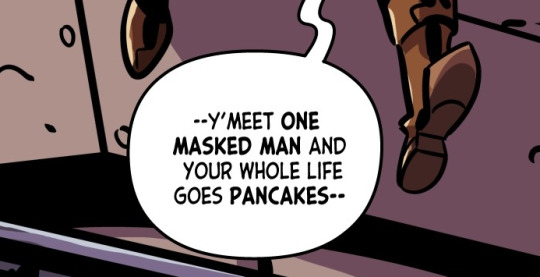
So @artbyblastweave made a post recently talking about how deeply, almost monstrously self-referential the superhero genre is, and even has to be by design, in response to an ask about elements ubiquitous to the genre and/or stories, and whether these elements are requirements. They gave me a shout-out saying I could provide a more informed perspective on how the pulp heroes hang around in superhero universes “as objects of tribute and parody”. That got me thinking, thinking about how many works do employ this kind of thing, who use that idea of “there used to be weird not-quite-superheroes up until the 30s, that eventually gave way to the real thing” for worldbuilding.
Thinking about how, everywhere you look in superheroes and superhero universes, you see remnants big and small of that pulp fiction bedrock they were raised from and above, mixed with so many hundreds other things that shouldn’t even be called “pulp fiction” but still gets to share the name because there’s nothing else to call them, because they have just enough in common, because most of it is all in the past, and the past is an amorphous shadow hanging over our heads made of everything that isn’t What-Is-Now and What-Will-Be-Then, growing larger and more stuffed with every tick, as What-Was-Before encompasses every second so far.
You see it in comics, you see it in movies and cartoons adapting the comics. You see it in the Justice Society and Black Adam, you see it in the Black Panther mythos, you see it in Batman and Superman and Namor and Watchmen and Invincible and Black Hammer and every Sherlock Holmes reboot and every James Bond reboot and everywhere if you know where to look, if you know some of the names and inspirations behind the wires and strings that put these tapestries together. Maybe it isn’t there, maybe it is. Maybe it never was, maybe it never stopped being.
In that post about The Question, I argued about Archetypes and Ectypes and how they relate to one way to define The Superhero, and the post linked above argues more in-length the idea that what ultimately defines the superhero is the proximity to other superheroes and the “superhero genre”, it’s the context by which they exist propped up by the massive defining Archetypes of Batman and Spider-Man and Superman as the biggest of all. But still: If that’s what defines The Superhero, what defines The Pulp Hero?
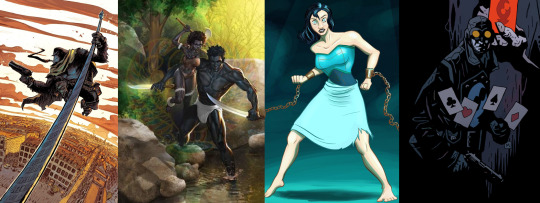
(Pictured left-to-right: Six-Gun Gorilla by Jeff Stokely, Imaro by Mshindo Kuumba, Olga Mesmer by DevinQuigleyArt, and Lobster Johnson by Mike Mignola)
Nowadays, I don’t think it really has that much to do with the character’s proximity to “pulp fiction”, as I once argued in delineating differences between pulp heroes and superheroes. Once you get past the literal fiction printed in wood pulp paper or similarly cheap paper, most of which just doesn’t exist anymore especially outside of America, “pulp” nowadays exists as a term akin to something like “dark academia” and things whose name ends with -core, in that it only functionally exists to point to a “vibe” that broadly overlaps with a lot of other things. Not wholly useless, but not concrete enough either for what we’re looking for.
Is it by proximity to the origin of the “pulp hero” concept as is with superheroes and Superman? Well, in theory, but that implies “pulp hero” is a term with history and definition and tangibility, and it just doesn’t have that in the same way. There is no tangible “first pulp hero” akin to the way we point to Superman as a breakthrough. Closest the term has to an origin is as a bizarro offshoot of “hero pulps”, which is a term coined to describe pulp magazines that were about the exploits of a larger-than-life hero, constitute a really, really small margin of the broader landscape of what pulp fiction comprised and entailed, and it exists largely to describe characters with a specific “vibe” that can invite comparison to said hero pulps. “Hero pulp” defines something that plainly doesn’t exist anymore and is, in itself, dubious as a term to begin with when you bring in other factors like dime novel heroes and feuilleton heroes and etc that all used the exact same format and even printing paper, but it’s a definition still.
What does “pulp hero” define to begin with?
That term defines and groups characters who, for several reasons, fit in that “vibe” one way or another. It groups a lot of characters who didn’t really appear or attain fame in pulp magazines like The Green Hornet, The Spirit and Flash Gordon, but who are still seen as “pulp heroes” because they have that “pulp vibe” to them. That amorphous shadow hanging over them that makes them Of The Past, When The Dinosaurs Pulps Ruled America. Calling a character a “pulp hero” separates it from the superheroes but still implies that they work by similar rules, that they fit under a comprehensive umbrella, that they all belong under the same medium or term or even vibe and they just, didn’t, it didn’t work that way, except it does now.
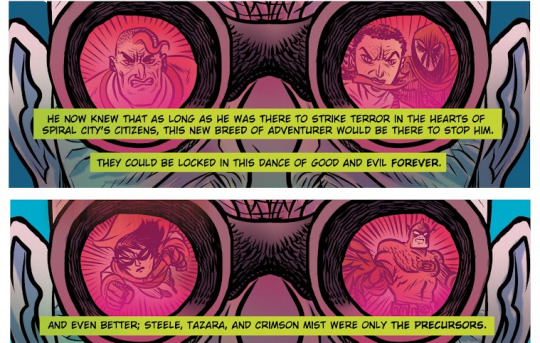
Because Pulp Hero is a term that derives meaning and definition from it’s proximity to The Superhero. By that term which establishes that, characters from an irreconcilably vast range of genres, aesthetics, sensibilities, mediums and contexts can all be remixed together forever and ever and still all fall together under the same definition, so long as you combine the Hero prefix with a signifier and origin they all have in common (Super-/Superman or works defined by Superman and/or superheroes existing).
Superheroes exist and propagate through context, through contact and proximity, viral meme conquerors who’ve entered the 21st century in a mission to obfuscate and destroy and incorporate everything standing in their way through non-stop self-reinvention and transformation, and what happens to some dozens and hundreds of characters whose biggest or only claim to fame nowadays is their proximity to superheroes? Well, the obvious: They become, in a way, superheroes as well.
Within the period where these pulp characters were actually around (which still includes today even), it didn’t make sense to group them together as if they were the same thing or operating in the same spaces when they very, very clearly weren’t. The term didn’t exist because it didn’t have to exist. It would be like grouping every protagonist in Netflix’s film and series catalogue a “Flix Hero” just because they are all film-based, and even that would make more sense considering how many of these countless 1890s-1950s characters aren’t even sharing the same mediums to begin with.
But when those characters all do start to be joined together by virtue of existing in the same space within the cultural imagination, within the same mediums, existing together at all to begin with, in the context through which everyone first discovers them now? Then it makes sense that inevitably, someone would have to coin a name to call them under one thing. To call them as they see it, The Not-Superheroes Of Old. As precursors to the superheroes, as backstory fodder, as characters you’re aware exist and that’s it, as Those of The Past, The Retro Serial Guys, The Granddaddies That Don’t Show Up Anymore, The Only Ones We Still Kinda Remember Existing To Begin With, Runaways and Prisoners Alike From What-Was-Before. It isn’t what I think of, or want, them to be, but it is undeniably what we’ve all been calling them the last years.
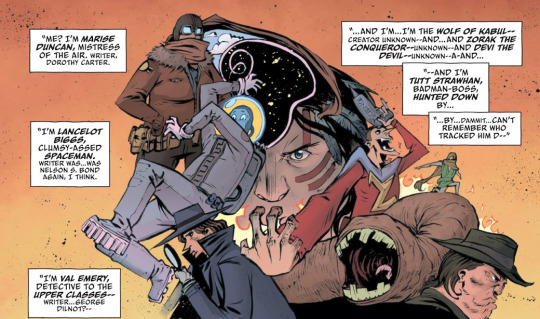
Whether they predate them or not, whether they were made to exist in their worlds or not, that term still defines them first and foremost by their proximity to the superheroes. Only brought together because of ways they are retroactively forced into being seen or becoming more like superheroes, even in the ways they are not. After all, superheroes can be everything, they’ve become everything now. The pulp heroes simply came first as the direct forerunners. Transmutated by proximity to the viral meme, into becoming a part of it.
When superhero universes gesture at them through tribute or parody or both, that’s, in a nutshell, what the superhero genre has done on a larger scale: reach through time and make it so that the pulp characters are now recontextualized into missing links and stepping stones, encubators and trial runs for what would replace everything else as The Biggest Thing Ever. Whether dignified precursors or embarassing prototypes, whether this adds meaning to the pulp heroes or strips it away from them, whether it embellishes or diminishes them, whether this is what saved these characters or doomed them, or all at once, it’s all the same.
To be more conclusive: It’s not that I think all of these characters, pulp characters, were or are superheroes. But it seems that, if we are to assign them as “pulp heroes”, if they are to be seen as feature parts of a tapestry under which they can all exist and be studied and portrayed as “pulp heroes”, that is, in a way, binding them irrevocably to the superheroes that they are defined in opposition of. It is the thought exemplified by what these superhero works do, when they depict analog Shadows and Docs and Tarzans as only nominally-important parts of a superhero universe, usually stripped of most of everything that defined these characters as they were, and not as what they are under the superhero. The end result of these characters having the mark of historical fossils stamped on their foreheads, for better or worse.
I’m not even arguing this as an inherently bad thing for all of them, a lot of the pulp characters actually do stand to benefit a great deal from becoming superheroes, reshaped or influenced by superhero sensibilities. What I am saying though, is that it might have been a lost cause to try to argue so much, as I have, that The Pulp Hero isn’t defined so extensively by their relationship with the past and their current standing as precursors to the superheroes, when the very name we use to call them already comes inextricably bound to both of these things.
We call these characters Pulp Heroes only because there isn’t anything else to call them, but for many, it isn’t, and shouldn’t be, the sum of what they are. In fact, when you do see modern characters who borrow so strongly from those pulp heroes that they would unmistakeably be labeled as such in the past, you see that they only stand to gain from rejecting said label and that pulp/superhero paradigm.
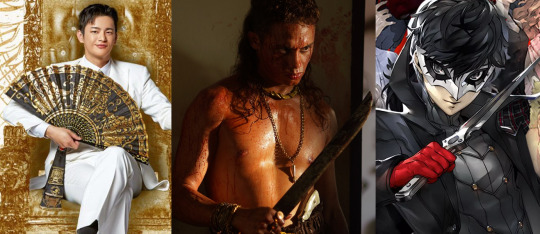
(Pictured: Nam Han-Joon from Café Minamdang, Lunga from Bacurau (2018) and Joker from Persona 5, all of which borrow from and correlate heavily with, respectively: Sherlock Holmes and modernizations of the Great Detective pulp archetype, the Cangaceiro as a popular figure of cordel literature and Brazilian equivalent to the cowboys and gangsters of American folk lore, and Arsene Lupin and the social struggles and rebellion that made him such a game-changer for the Gentleman Thief as a literary icon)
There is a great usefulness to the Pulp Hero label for categorizing, understanding and conveying characters that could not exist outside of that space, who do need to belong under that umbrella and exist neighboring that superhero paradigm. It is very much a case-by-case basis, is what I’m saying. However, it also seems that many of these characters would benefit more from breaking away from that pre-established term and paradigm. Maybe it’s useful to keep in mind that setting out to create a “pulp hero” who purposefully has nothing to do with superheroes is, kind of a losing game when you assign the term “pulp hero” to begin with. A term created by superhero context, created to exist within superhero rules, a separate room within the same house.
It doesn’t have to be a bad thing, but it also doesn’t have to be the only way. That’s the thing about labels in general, they are like boxes. They either fit, or don’t. Boxes can be great, boxes can be really useful, lots of beings really like to be in boxes, everyone wants to find a box that fits you or your things most neatly. But when a box doesn’t fit, or gets imposed onto you by others, or turns into a prison? That’s your cue to leave and go get a new one. I don’t think “pulp hero” is a bad box to put so many of these characters in, but it is a box nonetheless, and one with more limits that I’d previously realized or wanted to admit so, yes, I do think we should find some other ones.

#pulp fiction#pulp heroes#feels weird using that tag but again#what else am I gonna call them#black hammer#six-gun gorilla#this post is kind of why I've never really liked calling The Shadow a pulp hero#or an articulation of why doing that always came with some discomfort#yes it is what he is but#it's frustratingly limited a way to describe him I think#literature#pulp magazines#superheroes
51 notes
·
View notes
Note
Going through and seeing you love The Shadow, but is there a post where you clearly outline why you love The Shadow, rather than dissections of his character and mythos? I’ve read a couple of posts and want to learn more.
Well, one of the first posts I ever made about The Shadow waay back in 2017 was a reply stating 4-5 reasons why I liked the character, and none of those have changed. And I consider most of those dissections of the character and mythos and everything to be also me stating reasons why I love him.
But I figure now's as good a time as any to really go in-depth about it. I've been feeling a bit stressed and overwhelmed recently, so it could be good to dissect my heart a little on here. Not so much why I like The Shadow, but why I like The Shadow, or rather, part of what The Shadow means to me.
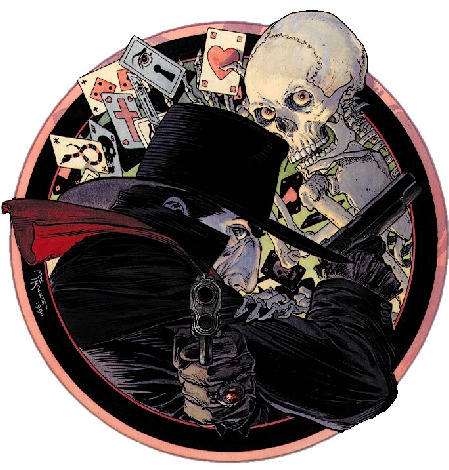
This one's gonna get a little too personal, so I'm putting it under the cut.
To an extent, the history of why I like The Shadow is partially the history of how The Shadow sort of merged a lot of my interests together. Everything you like is informed by a myriad of experiences that inform the tapestry of your life and personality.
I've spent my whole life going through these periodic obsessions that I didn't discover until very recently are things people call "hyperfixations", and for me those tend to last about a year or two at least. The Shadow is one of the things I tend to hyperfixate on and will give essays and lectures on to anyone who gives me permission to do so, which used to be basically no one until I opened this blog and found an outlet I spent my whole life looking for.
I love monsters, of any and all sorts, especially when they are good guys or protectors, and The Shadow's got a lot more in common with them than the average hero. I love horror and comedy and those are baked into a lot of what I create artistically, and The Shadow offers no shortage of opportunities for both (seriously, people don't appreciate enough just how funny The Shadow's stories can be, especially in the original pulps)
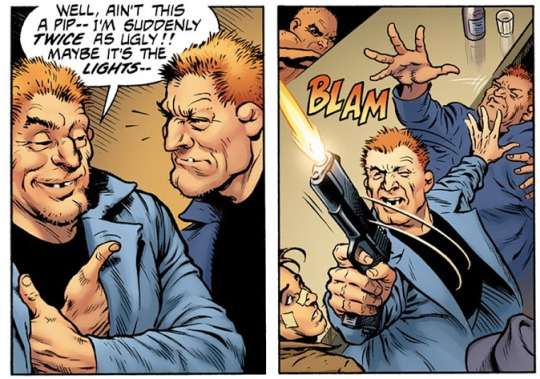
I love supervillains in various shapes and forms, and the secret of The Shadow's success was that he was a hero who had the charisma and personality of a supervillain. I like unambiguously heroic characters a lot too (my favorite JoJo is Jonathan) and my favorite stories are more positive ones, and The Shadow's agents are meant to fill in those roles.
I love variety and ambiguity and questions in storytelling, and here we have a character who can become anything a story calls for, as well as facilitate stories about any kind of character or adventure. I love discovering and digging into and researching obscure, forgotten or neglected things, and finding The Shadow opened the doors to me getting into pulp fiction. I live in a perpetually restless search for knowledge, and The Shadow is a character I literally never run out of new things to discover or talk about.
My first real obsession in life was with sharks and dinosaurs, and all I'm gonna say further on that for now is, that's the first thing anyone who googles my real name learns about me. A lot of the traits I like about those two subjects are things I also identify in The Shadow, too much for me to make a list, and I'm not the only one to do so.
On the taxonomical chart of Western comics he’s a common ancestor for a sizeable chunk of the marketplace. Every street vigilante, every masked crime-fighter, every necessary monster: he’s in the DNA of them all. A living fossil, a coelacanth or goblin-shark for the comics world, swimming in waters of ice and ink. And like all perfectly engineered things he endures – he flourishes – amidst newer, cockier, less perfect specimens - Si Spurrier, and say whatever you want about his story, I don't care, this quote is gold
If I had to pinpoint a specific experience in childhood that I can tell really informed my fixation on The Shadow (and isn't too personal to talk about), it would probably be when I got this Wolverine board game.
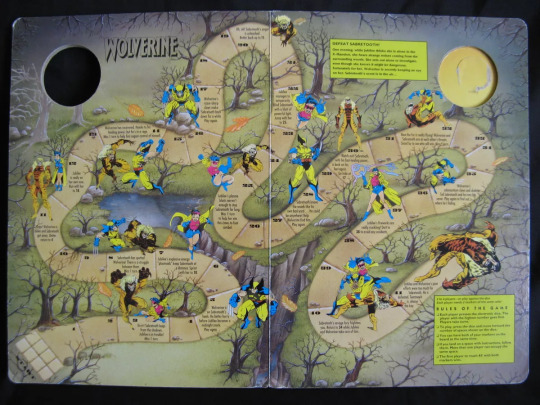
Defeat Sabretooth! One evening, while Jubilee thinks she is alone in the X-Mansion, she hears strange noises coming from the surrounding woods. She sets out alone to investigate, even though she knows it might be dangerous. Fortunately for her, Wolverine is secretly keeping an eye on her. Sabretooth's scent is in the air. . .
Now, by this point Wolverine was already my favorite superhero, that's why my mom got me the game to begin with. I watched the cartoons and had seen the movies and played with the toys and whatnot, I had an idea of what he and Jubilee and Sabretooth were. But this game was like nothing I had seen before.
I mean, for one, look at the background, look at just how dour the whole scene is, nothing but barren plantlife and cracked soil and dead trees. The only other superhero stories I had encountered by this point were just the usual saving-the-city stories or big team ups. But here? The story in it is that Jubilee, ostensibly a kid, is alone, in a horrifying forest, and there is a murderous wild man stalking her to kill her. He could be anywhere, he will not stop, he's getting closer by the second, and the only thing that stands between her and death is Wolverine.
Because I only knew the characters through cartoons and film, it had never really dawned on me before this game that, oh god, people die in these stories. Sabretooth likes to maim and torture and kill people, and he's going to do something horrifying to Jubilee, a kid (about the same age my sister was back then), and Wolverine, the other murderous wild man in the woods, is the only one who can stop this from happening. And you gotta help him. You gotta roll the dice so he doesn't get caught up in his own rage, you gotta watch your step so Sabretooth doesn't get the upperhand, and eventually, both Wolverine and Jubilee work together to stop him.
The woods were still scary, Sabretooth was still scary, but Wolverine was there, and he knows how to be scary too.
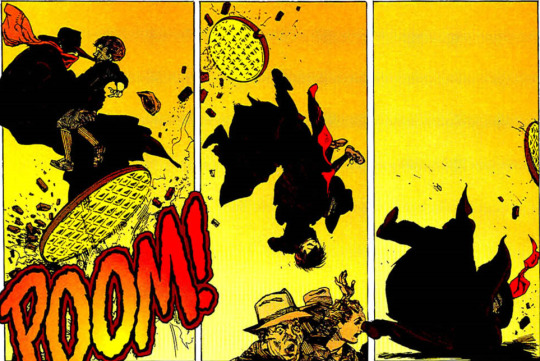
That fantasy idea of "the world may be scary beyond your understanding and full of bad people, but The Boogeyman, the scariest guy around, is on your side and will fight to protect you" appealed very, very strongly to me, more so than any other kind of superhero fantasy I was offered then, that made characters like Wolverine, Godzilla and Sagat some of my all-time favorite fictional characters, and it was something that I identify now as one of the big reasons why I liked The Shadow so much. He's The Ultimate Boogeyman.
He prowls like the Invisible Man and moves around like a silent film villain. He's got the mouth mask and gun-toting intensity of a Western bandit. He talks like Hannibal Lecter, dresses as and controls minds like Dracula, and controls the streets with tactics from Vito Corleone's playbook. Like the Wolf Man, he takes off the skin of man to reveal a beast of fury upon the world. He is a masked genius with an unnatural voice and a penchant for dramatics like The Phantom. He haunts the nightmares of evildoers in a silhouette Freddy Krueger borrowed, and when he shows up physically to wreak havoc, he is Jason Voorhees as a gun-toting action hero. Like so many alien invasion stories, he's a walking conspiracy where anyone you know could be either him in disguise, or working for him, and you wouldn't know until it was too late.
He is inscrutable, unknowable, vast and brain-scrambling to be around. He is mistaken for a ghost, and may or may not be one in real life. Like the Twilight Zone, he is a supernatural agency that normal people encounter that teaches them a moral lesson. He gives nightmares to the worst of the worst, and often he misleads or scares even those who work for him and the reader, for no one is too safe from The Shadow's range.
And he's a good guy who will throw himself on the path of death time and time again to ensure innocents are not victimized, and who dedicates everything he is and has to ensure the safety and wellbeing of others. He doesn't work for the government, he doesn't hesitate to mislead or even punish authority figures such as policemen or mayors, he doesn't hesitate to fight for people in places outside of the US, and he uplifts those who can fight to improve society in ways he cannot, because he's gathered people "from all walks of life" under his sworn protection.
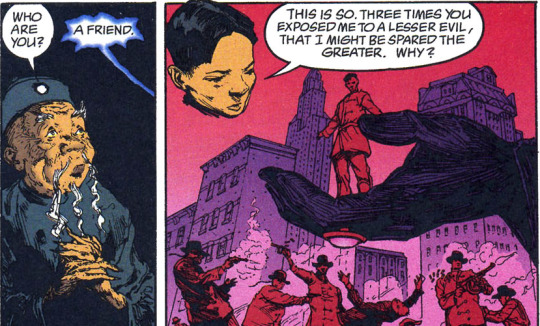
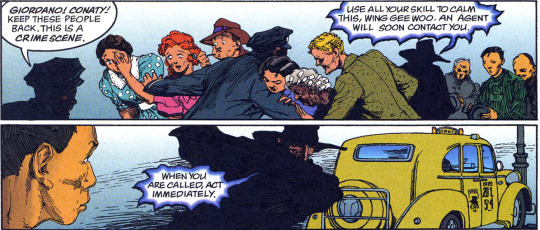
There was no sound of the door closing; no sound, indeed, to indicate that any person had moved in that direction. Yet Burbank knew, from experience, that his master, The Shadow, had departed, after giving him the sign that his vigil was ended.
Such word usually came from The Shadow’s sanctum. Tonight, being in the vicinity of Burbank’s present station, The Shadow had preferred to give his faithful agent fifteen or twenty minutes of extra respite by visiting him in person.
Such was the way of The Shadow. Though none of his trusted operatives had ever seen his undisguised face; though his ways and actions were secret and mysterious to them; they received constant signs of The Shadow’s appreciation of their reliable cooperation - Death Triangle
I'd say this is one of the other big things that I really like about The Shadow, that his main skill, the biggest power he has at his disposal, is knowledge. Specifically, his knowledge of people. I liked the character at first sight, but it wasn't until I discovered the pulps, it wasn't until I read @oldschoolcrimefighters's blog posts on the myriad of ways The Shadow helps people in ways that betray his pop culture image as an unfeeling murder machine, that my feelings on the character went from "super cool new character under my nose this whole" to "I'm going to spend the rest of my life obsessing over this and working tirelessly for five years (so far) just to understand as much as I can about him and try to get others to see what I see"
I've never really had an easy time getting along with people. There were many times where I desperately wished I only knew what was the right thing to say or do, the one thing I could have done, what would be the "normal" or acceptable course of action to take or say so that I could be in peace and people would leave me alone or at least accept me. Many times where I desperately wished I could interact with the world through my own terms instead of those others imposed on me.
If I may get a little too personal here, I was a shut-in "gifted" kid with autism who kept getting bullied and harassed and beaten at school, who still preferred to stay at school at times because it was a preferable alternative to an abusive household. Who then grew into a shut-in teenager too big and weird to be bullied, but still didn't really have anyone to hang out with or talk most of the time. Even now in adulthood, as I've done a pretty ok job speedrunning through a lot of ordinary things like making friends and going to parties (like they do on TV!), I still often find myself reliving a lot of anxieties and fears I keep telling myself I'm through with.
I don't look back on my childhood at all and every year since I've become an adult has only been better and better (except for 2020 but, y'know, 2020, and I'd still take 2020 over some of my teenage years). I've made peace with a lot of things, I'm trying to build myself into what I want to be every day, and I get frustrated everytime I feel like I'm slipping back. Which has been a lot, lately, but it's a struggle to be overcome.
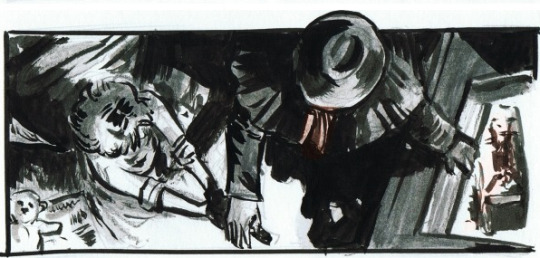
I think, to an extent, The Shadow is a lot of what I wish I either had from a paternal figure when I was younger, or wish I could be, then and now, I suppose. Someone who knows the right things to say, the right language to use, the right steps to take. Who sees your worth and the good in you and the things you are going through and need help with, no matter who or what you are. Who's always got your back, who's gonna find you at your lowest point and uplift you and take you to a different life. Who promises you exactly what you want or need the most, and then either gives it to you or shows you how to attain it.
Someone who's gonna help and protect you, even when no one else can or will. Who can go anywhere, be anyone, do anything. Who's surrounded by people who were once just like you, but found strength and support and community and friendship in each other under his wing. Someone who's rebuilt himself into something impressive and extraordinary, to tip the scales and help others find their own callings in life.
I think the appeal of The Shadow is and always has been that he's a power fantasy, which is true of any and all heroes in fiction. I get that this kind of connotation can hold some incredibly negative meanings, but to me, that's always been really the main fantasy of The Shadow. The Ultimate Boogeyman being both The Ultimate Teacher and The Ultimate Ally at once. And still, I like that The Shadow is not the ultimate hero of the narrative.
You are.
Not everyone can be The Shadow. In fact, no one should be The Shadow. The Shadow is no one. But there are many Harries and Margos and Shrevies and Jerichos out there with just as much potential to be great people, great heroes and forces of positive change, struggling and dying every day because no one is there for them.
The Shadow isn't real. Of course he isn't real. And like all heroes, he's imperfect. No one should imitate him, his tactics, his persona, anything. The minute you stop reading a Shadow story, the minute you stop thinking about him, he's no longer there, in fact, he never was. Heroes are just people, and people are imperfect.
It doesn't make what you stand for, what you see in your heroes, what you see in people like those who fight with them, any less true. What you see in them is what you already believe in. All you saw was just a stronger, idealized fantasy of what you could do, could be, could fight for or strive for, and once it was done, you had to make terms with the fact that it wasn't real, and you can choose to let it die with them, or pass it on however you can.
I don't believe The Shadow is real, or should be real. But his agents are, you walk past them everyday. You might be one yourself. What does that mean?
You tell me.
Or maybe I'm just trying to find some meaning to the countless hours I've spent spreading the word of a weird guy in a slouch hat who hid under the floorboards of my brain and hasn't left in over half a decade.
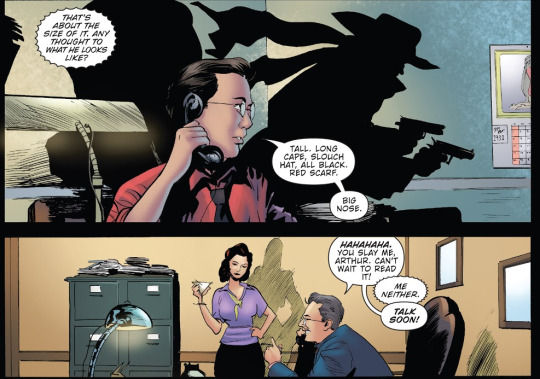
He could at least pay me rent while he's there.
29 notes
·
View notes